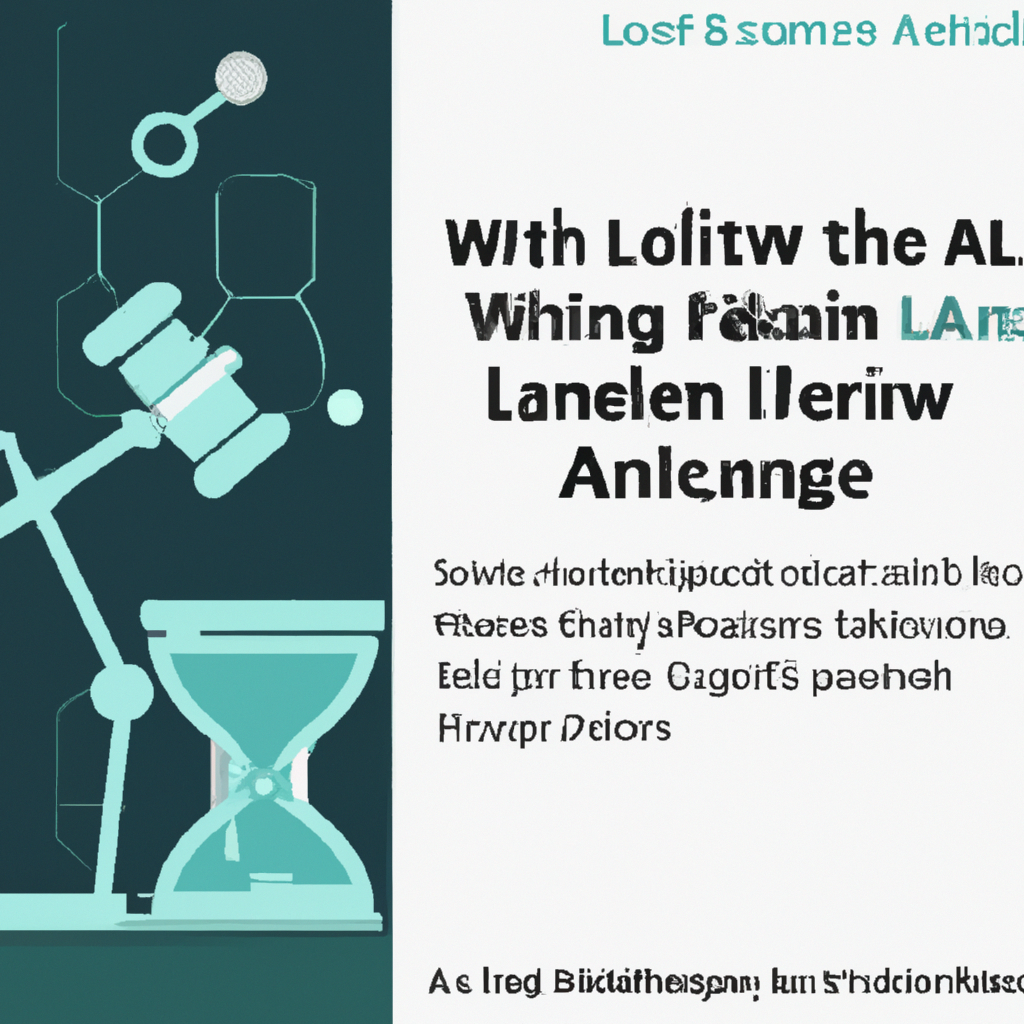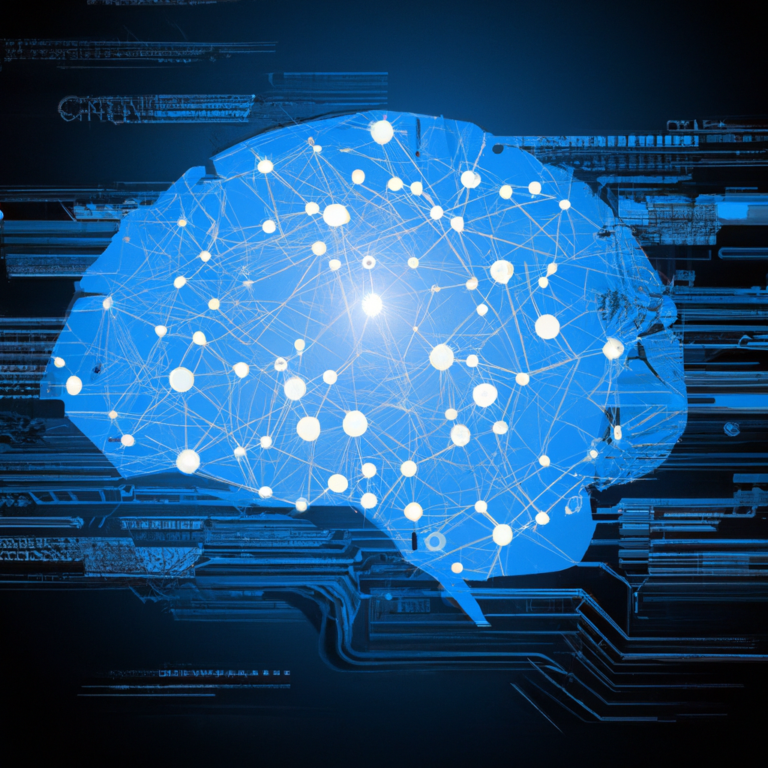AI And The Law: How AI Is Changing The Legal Landscape

In today’s fast-paced world, artificial intelligence (AI) is revolutionizing various industries, including the legal field. AI has become a game-changer, transforming the way lawyers and legal professionals approach their work. From predictive analytics to contract analysis and even virtual assistants, AI is streamlining processes, improving efficiency, and changing the entire legal landscape. In this article, we will explore the impact of AI on the legal industry, highlighting the benefits and potential challenges it brings. Prepare to be amazed at how AI is reshaping the way law is practiced.

The Fundamentals of AI
Artificial Intelligence Defined
Artificial intelligence, commonly referred to as AI, is a branch of computer science that focuses on creating intelligent machines capable of performing tasks that typically require human intelligence. AI systems can analyze vast amounts of data, recognize patterns, and make decisions or take actions based on their analysis. These systems can learn from experience, continuously improving their performance over time. AI encompasses a range of technologies, including machine learning, natural language processing, and computer vision, which enable computers to perceive the environment, understand language, and make decisions.
Key Components of AI
AI systems consist of three main components: perception, learning, and reasoning. Perception involves gathering information from various sources, such as sensors or databases. Learning refers to the process of acquiring knowledge from the available data and adapting to new information. Reasoning involves using the acquired knowledge to make informed decisions or take appropriate actions. These components work in harmony, allowing AI systems to effectively mimic human intelligence and perform complex tasks.
Types of AI
There are different types of AI, categorized based on their capabilities and level of autonomy. Narrow AI, also known as weak AI, is designed to perform specific tasks within a limited domain. Examples include voice assistants like Siri or Alexa, which can understand and respond to voice commands. General AI, on the other hand, aims to possess human-level intelligence and perform any intellectual task that a human can do. However, achieving true general AI remains a challenge.
Applications of AI in Law
AI is revolutionizing the legal industry by providing innovative solutions to various challenges. From automating routine tasks to enhancing legal research, AI technologies are transforming the way legal professionals work. These technologies have the potential to streamline processes, improve accuracy, and enable lawyers to focus on higher-value activities. In the following sections, we will explore how AI is benefiting the legal industry in more detail.
Benefits of AI in the Legal Industry
Automating Routine Tasks
One of the significant benefits of AI in the legal industry is automating repetitive and time-consuming tasks. AI-powered systems can now draft legal documents, such as contracts or agreements, with minimal human intervention. This automation can save considerable time and reduce the likelihood of errors. Additionally, AI can assist in managing administrative tasks, such as scheduling appointments, managing calendars, and organizing case-related information, enabling lawyers to focus on more complex and strategic work.
Enhancing Legal Research
Legal research is a crucial aspect of any legal work, requiring extensive analysis of statutes, case law, regulations, and legal precedents. AI has revolutionized legal research by providing advanced tools that can analyze vast amounts of legal information in a fraction of the time it would take a human researcher. AI-powered platforms can quickly find relevant cases, statutes, and regulations, saving lawyers valuable research time. These tools can also assist in predicting the outcome of cases based on historical data, providing valuable insights for legal strategy.
Improving Document Analysis and Review
Reviewing and analyzing large volumes of documents is a time-consuming and labor-intensive task in the legal industry. AI-powered document analysis tools can assist in this process by automating the review of documents for relevant information, such as contract terms, clauses, or legal risks. These tools use natural language processing algorithms to understand and extract data from documents accurately. By speeding up document analysis, AI improves efficiency and allows lawyers to make more informed decisions based on the extracted information.
Enhancing Due Diligence
Due diligence is a critical process in legal transactions, involving a comprehensive review and assessment of the legal and financial risks associated with a particular matter. AI technologies can enhance due diligence by analyzing large volumes of data, such as financial statements, contracts, regulatory filings, and news articles. By automating the extraction and analysis of relevant information, AI enables lawyers to quickly identify potential risks and make informed decisions. This capability reduces the time and resources required for due diligence, making legal transactions more efficient.
Challenges and Concerns of AI in Law
Ethical Considerations
As AI becomes more prevalent in the legal industry, ethical considerations arise. Legal professionals must carefully consider the ethical implications of using AI in decision-making processes. Questions about accountability, transparency, and the potential for bias in AI algorithms need to be addressed. It is essential to ensure that AI systems are programmed to uphold ethical principles, respect privacy rights, and adhere to legal standards.
Data Privacy and Security
With the increasing use of AI, legal professionals must be mindful of the collection, use, and storage of data. AI systems rely on accessing and analyzing large amounts of data, which could include sensitive personal or confidential information. Protecting the privacy and security of this data is crucial to maintain public trust and comply with data protection regulations. Robust data management strategies and secure infrastructure are essential to mitigate the risk of data breaches and unauthorized access to sensitive information.
Bias and Fairness
AI systems are only as unbiased as the data they learn from. Concerns about bias arise when AI algorithms rely on historical data that may perpetuate existing biases or discrimination. It is crucial for legal professionals to ensure that AI systems are trained on diverse and representative data to avoid reinforcing bias. Regular monitoring and auditing of AI algorithms are necessary to identify and rectify any potential biases or unfair outcomes.
Accountability and Liability
As AI systems become more autonomous and capable of making decisions, issues of accountability and liability arise. If an AI system makes a significant error or causes harm, who should be held responsible? The legal framework surrounding AI and its impact on decision-making needs to be carefully defined to ensure that there is clear accountability and established procedures for addressing any issues that may arise. This includes determining the roles and responsibilities of humans in overseeing AI systems and ensuring that their decisions align with legal and ethical standards.
AI-powered Legal Research Tools
Natural Language Processing
Natural Language Processing (NLP) is a branch of AI that focuses on enabling computers to understand and interpret human language. In the legal industry, NLP allows AI systems to analyze and extract relevant information from legal documents, such as contracts, statutes, and case law. These systems can understand the context and meaning of legal language, improving the accuracy and efficiency of legal research. NLP-powered tools can also assist in automated summarization of legal texts and generate concise summaries for quick reference.
Case Outcome Predictions
AI-powered tools are increasingly capable of predicting the outcome of legal cases based on historical data analysis. By analyzing similar cases, legal precedents, and the characteristics of the parties involved, these tools can provide insights into the likely outcomes of ongoing cases. Case outcome prediction tools can assist lawyers in developing legal strategies, estimating the potential risks and benefits of pursuing a case, and ultimately making informed decisions.
Legal Analytics
Legal analytics involves the use of AI and data analysis techniques to derive insights and patterns from vast amounts of legal data. These analytics tools can help lawyers identify trends, evaluate risks, and make data-driven decisions. For example, legal analytics can provide information on the success rates of specific legal arguments, the track record of judges, or the popularity of particular legal strategies. By leveraging data analytics, lawyers can gain a competitive edge and improve the quality of their legal services.
Contract Analysis Tools
Contracts are a fundamental part of legal practice, requiring detailed analysis and review to identify crucial terms, obligations, and potential risks. AI-powered contract analysis tools can streamline this process by automating the extraction and analysis of contract data. These tools use machine learning algorithms to identify key clauses, highlight risky provisions, and compare contracts for consistency. Contract analysis tools save time, reduce the risk of human error, and improve the accuracy and efficiency of contract management.

AI in Predictive Policing and Crime Prevention
Identifying Hotspots and Patterns
AI technologies play a crucial role in predictive policing by analyzing vast amounts of historical crime data to identify hotspots and patterns. By pinpointing areas with a higher likelihood of criminal activity, law enforcement agencies can deploy resources more efficiently and effectively prevent crime. AI algorithms can analyze various factors, such as time, location, and demographics, to generate actionable insights and guide law enforcement strategies.
Risk Assessment and Sentencing
AI can assist in risk assessment and sentencing by analyzing relevant data to predict the likelihood of recidivism or the severity of criminal behavior. By considering multiple factors, including criminal history, social environment, and individual characteristics, AI algorithms can provide insights that can help judges make more informed decisions regarding the appropriate punishment or sentencing conditions. AI-based risk assessment tools aim to enhance fairness, consistency, and accuracy in the criminal justice system.
Monitoring Compliance
AI technologies can be employed to monitor compliance with legal and regulatory requirements. For instance, in financial regulatory agencies, AI algorithms can analyze large volumes of financial transaction data to detect suspicious activities or potential violations. By automating the monitoring process, AI systems can identify patterns and anomalies that may indicate non-compliance, enabling timely intervention and enforcement actions.
Predicting Legal Risks
AI can also help predict legal risks by analyzing various data sources, including legal precedents, regulatory changes, and industry trends. By identifying potential legal risks in advance, businesses can take proactive measures to mitigate these risks and ensure compliance with applicable laws and regulations. AI-powered risk prediction tools can provide valuable insights to legal departments, enabling them to make informed decisions and take proactive actions to address legal challenges.
AI’s Role in Contract Management
Automating Contract Drafting
AI technologies are transforming contract management by automating the contract drafting process. AI-powered contract drafting tools can analyze previous contracts, legal templates, and relevant regulations to generate first-draft contracts based on specific criteria or variables. These tools can significantly reduce the time and effort required to draft contracts, ensuring consistency and accuracy while minimizing the risk of errors or missing crucial terms.
Contract Review and Risk Assessment
AI can enhance contract review and risk assessment by automating the analysis of contracts for potential risks or problematic clauses. By using natural language processing algorithms, AI systems can identify ambiguous language, non-standard clauses, or unfavorable terms present in contracts. This automated review process assists legal professionals in quickly identifying potential risks, ensuring compliance, and negotiating favorable terms.
Contract Analytics
AI-powered contract analytics tools enable organizations to gain insights from their contract data. These tools can extract and analyze contract information, such as key dates, obligations, and termination clauses, allowing businesses to monitor contract performance, identify opportunities for optimization, and mitigate risks. By leveraging contract analytics, organizations can make data-driven decisions, improve contract management processes, and enhance overall contract performance.
Contract Lifecycle Management
AI technologies can streamline the contract lifecycle management process by automating various stages, such as contract creation, negotiation, execution, and renewal. AI-powered contract lifecycle management systems enable efficient collaboration among stakeholders, enforce compliance with contract terms, and provide valuable insights and analytics for continuous improvement. By automating routine tasks and optimizing workflows, contract lifecycle management systems enhance efficiency, accuracy, and operational performance.
AI Technology in Courtrooms
Virtual Assistants for Judges
AI-powered virtual assistants can provide judges with valuable support by automating administrative tasks, conducting legal research, and preparing case summaries. These virtual assistants can analyze legal documents, identify relevant case law, and generate concise summaries or briefs for judges’ review. By reducing the time spent on administrative work, judges can focus more on deliberating cases and making informed decisions.
Automated Legal Transcription
AI technologies can significantly improve the accuracy and efficiency of legal transcription. Advanced speech recognition algorithms can convert spoken words into written text, saving time and resources compared to manual transcription. AI-powered transcription tools are trained to recognize legal terminology, jargon, and complex language often used in legal proceedings. Automated legal transcription enhances the accessibility of court reports and enables quicker access to relevant information for legal professionals.
Electronic Discovery
The process of electronic discovery, which involves identifying and reviewing relevant electronic documents for legal proceedings, can be time-consuming and costly. AI technologies can streamline electronic discovery by automating the identification, classification, and extraction of relevant information from vast amounts of electronically stored information (ESI). AI-powered tools can quickly analyze and categorize documents based on their relevance, reducing the time and effort required for manual review.
AI in Sentencing and Judgments
AI technologies are being explored for their potential in assisting judges in determining appropriate sentences and making judgments. These technologies analyze various factors, including the severity of the crime, the defendant’s criminal history, and similar cases, to generate insights that can guide judges’ decisions. While AI can provide valuable information, it is essential to ensure that these technologies are used as tools to support decision-making and not as substitutes for human judgment, maintaining the fairness and accountability of the legal system.
Ethics and Regulation of AI in Law
AI Bias and Discrimination
Ensuring that AI systems are free from bias and discrimination is crucial for maintaining trust and fairness in the legal system. Bias can be unintentionally introduced when AI algorithms learn from biased or unrepresentative data. Legal professionals and AI developers must work together to identify and address potential biases in AI systems, regularly auditing algorithms and leveraging diverse and representative training data to mitigate the risk of biased outcomes.
Transparency and Explainability
AI systems in the legal context must be transparent and explainable to ensure accountability and ethical decision-making. Understanding how an AI system arrived at a particular decision or recommendation is crucial for legal professionals, judges, and clients. AI developers and legal professionals need to work together to create transparency frameworks that allow for the explanation and justification of AI-generated outcomes to promote trust and confidence in AI technology.
Ethical Guidelines for AI in Law
To address ethical considerations in the use of AI in law, ethical guidelines and standards specific to AI systems are necessary. Legal professional bodies and AI organizations should collaborate to develop and enforce ethical guidelines that govern the use of AI in legal contexts. These guidelines should cover issues related to privacy, data protection, fairness, accountability, and the responsible use of AI. By adhering to these guidelines, legal professionals can ensure that AI is used ethically and responsibly within the legal industry.
Regulatory Measures
Regulation plays a crucial role in ensuring the responsible use of AI in the legal industry. Governments and regulatory bodies need to establish frameworks that govern the development, deployment, and use of AI systems. These regulations should address ethical concerns, data protection, privacy, accountability, and transparency. By implementing clear and robust regulations, lawmakers can promote the safe and responsible use of AI technology in the legal landscape.
Impact of AI on Employment in the Legal Sector
Automation of Legal Jobs
The adoption of AI technologies in the legal sector has raised concerns about potential job displacement. AI-powered systems can automate routine and repetitive tasks, potentially reducing the need for certain administrative and research roles. However, it is important to note that AI is not meant to replace lawyers, but rather to augment their capabilities and improve efficiency. While some job roles may evolve or be impacted, the legal profession will continue to require human expertise, critical thinking, and judgment.
Role of AI in Legal Practice
AI technologies have the potential to reshape the role of legal professionals, allowing them to focus on higher-value work. By automating routine tasks, lawyers can allocate their time and expertise to more complex legal analysis, strategic decision-making, and client interactions. AI technologies can be viewed as valuable tools that enhance legal practice and enable lawyers to deliver more value to their clients.
Reskilling and Upskilling Opportunities
As AI technologies become more prevalent, legal professionals will need to adapt and acquire new skills to effectively work alongside AI systems. Reskilling and upskilling programs can help lawyers develop a deeper understanding of AI and learn to leverage its capabilities. Legal professionals can gain expertise in areas such as data analytics, AI ethics, and technology integration to ensure they remain competitive and effectively collaborate with AI systems.
Collaboration between AI and Lawyers
The successful integration of AI in the legal sector relies on fostering collaboration between AI technologies and legal professionals. Lawyers can provide valuable domain expertise and input to train and fine-tune AI algorithms, ensuring that the technology aligns with legal requirements and ethical standards. By collaborating effectively, lawyers and AI technologies can work together to optimize legal processes, enhance decision-making, and deliver better outcomes for clients.
The Future of AI in the Legal Landscape
Emerging AI Technologies
The field of AI is rapidly evolving, with new technologies continuously emerging. Natural language processing, machine learning, and computer vision are already making a significant impact on the legal industry, but advancements in areas such as robotics, knowledge representation, and explainable AI hold promise for the future. As these technologies mature and become more sophisticated, their applications in the legal landscape will expand, enabling even greater automation, efficiency, and accuracy.
Potential Disruption of Legal Services
The adoption of AI in the legal industry has the potential to disrupt traditional legal services. Automation of routine tasks, such as contract drafting or legal research, can drive down costs and increase efficiency, potentially reducing the demand for some traditional legal services. However, as AI technologies continue to evolve, new opportunities for legal professionals may arise, such as specializing in AI-related legal issues or providing consultancy on AI ethics and regulation. The legal industry must adapt and embrace AI to stay competitive and provide value-added services in the future.
Impact on Legal Education
The integration of AI into the legal landscape necessitates a shift in legal education to prepare future legal professionals for the AI-driven future. Law schools and educational institutions need to incorporate AI-related topics into the curriculum, providing students with the necessary knowledge and skills to navigate the intersection of AI and law. By emphasizing critical thinking, data analysis, and ethical considerations, legal education can produce graduates who are well-equipped to leverage AI technologies effectively.
Preparing for the AI-Driven Future
As AI continues to transform the legal landscape, legal professionals should proactively embrace AI advancements and capitalize on the benefits they offer. This requires staying informed about the latest AI technologies, understanding their applications in the legal domain, and continually developing the necessary skills to work collaboratively with AI systems. By embracing AI, legal professionals can deliver better outcomes, improve client experiences, and successfully navigate the evolving legal landscape.
In conclusion, AI is revolutionizing the legal industry by automating routine tasks, enhancing legal research, improving document analysis, and enabling more efficient contract management. Despite the many benefits, there are also challenges and concerns that need to be addressed, including ethical considerations, data privacy, bias, and accountability. AI-powered tools such as natural language processing, case outcome predictions, legal analytics, and contract analysis are transforming legal workflows. AI’s role extends to predictive policing, contract management, courtrooms, and the ethical and regulatory aspects of AI in law. While there are impacts on employment and legal education, the future of AI in the legal landscape holds tremendous potential for innovation and improved legal services. Legal professionals need to embrace AI, collaborate effectively with AI systems, and prepare for the AI-driven future to stay competitive and deliver value to their clients.
Want to write articles like us? Get your copy of AI WiseMind here!






